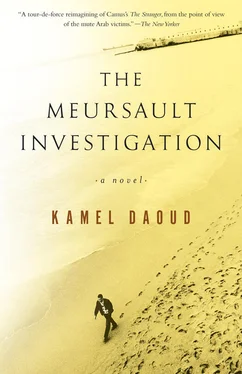Do you want me to reveal my secret — or rather our secret, Mama’s and mine? Here it is: One terrible night, over in Hadjout, the moon obliged me to finish the job your hero began in the sun. Anyone can blame his stars or his mother. That’s a ditch I dig all the time. My god, I’m really feeling bad! I look at you and I wonder how trustworthy you are. Will you believe another version of the facts, a version previously unknown? Ah, I’m hesitating, I’m not sure. No, look, not now, we’ll try another time, another day. Where to go, when you’re already dead? I’m rambling. I think you want facts, not parentheses, right?
After Musa’s murder, while we were still living in Algiers, my mother converted her anger into a long, spectacular mourning period that won her the sympathy of the neighbor women and a kind of legitimacy that allowed her to go out on the street, mingle with men, work in other people’s houses, sell spices, and do housework without running the risk of being judged. Her femininity had died, and with it men’s suspicions. I saw little of her during that time. I’d spend entire days waiting for her while she walked all over the city, conducting her investigation into Musa’s death, questioning people who knew him, recognized him, or crossed his path for the last time in the course of that year, 1942. Some neighbor ladies kept me fed, and the other children in the neighborhood showed me the respect you give seriously ill or broken people. I found my status — the “dead man’s brother” — almost agreeable; in fact, I didn’t begin to suffer from it until I was approaching adulthood, when I learned to read and realized what an unjust fate had befallen my brother, who died in a book.
After his passing, the way my time was structured changed. I lived my life in absolute freedom, which lasted exactly forty days. The funeral didn’t take place until then, you see. The neighborhood imam must have found the whole thing disturbing. Missing persons don’t have funerals very often … For Musa’s body was never found. As I gradually learned, my mother looked for my brother everywhere, in the morgue, at the police station in Belcourt, and she knocked on every door. To no avail. Musa had vanished, he was absolutely, perfectly, incomprehensibly dead. There had been two of them in that place of sand and salt, him and his killer, just those two. About the murderer we knew nothing. He was el-roumi , the foreigner, the stranger. People in the neighborhood showed my mother his picture in the newspaper, but for us he was the spitting image of all the colonists who’d grown fat on so many stolen harvests. There was nothing special about him, except for the cigarette stuck in the corner of his mouth, and his features were instantly forgettable, easy to confuse with those of all his kind. My mother visited lots of cemeteries, pestered my brother’s former comrades, and tried to speak to your hero, who no longer addressed himself to anything but a scrap of newspaper found under a mat in his cell. Her efforts were in vain, but they revealed her talent for idle chatter, and her mourning period evolved into a surprising comedy, a marvelous act she put on and refined until it became a masterpiece. Virtually widowed for the second time, she turned her personal drama into a kind of business that required all who came near her to make an effort of compassion. She invented a range of illnesses in order to gather the whole tribe of female neighbors around her whenever she had so much as a migraine headache. She often pointed a finger at me as if I was an orphan, and she withdrew her affection from me very quickly, replacing it with the narrowed eyes of suspicion and the hard gaze of admonition. Oddly enough, I was treated like the dead brother and Musa like the survivor whose coffee was hot and ready at the end of the day, whose bed was made, and whose footsteps were guessed at, even coming from very far away, from downtown Algiers and the neighborhoods that were closed to us at the time. I was condemned to a secondary role because I had nothing in particular to offer. I felt guilty for being alive but also responsible for a life that wasn’t my own! I was the guardian, the assas , like my father, watching over another body.
I also remember that weird funeral. Crowds of people; discussions lasting well into the night; us children, attracted by the lightbulbs and the many candles; and then an empty grave and a prayer for the departed. After the religious waiting period of forty days, Musa had been declared dead — swept away by the sea — and therefore the absurd service was performed, in accordance with Islam’s provisions for the drowned. Then everyone left, except for my mother and me.
It’s morning, I’m cold even under the blanket, I’m shivering. Musa’s been dead for weeks. I hear the outside sounds — a passing bicycle, old Tawi’s coughing, the squeaking of chairs, the raising of iron shutters. In my head, every voice corresponds to a woman, a time of life, a concern, a mood, or even the kind of wash that’s going to be hung out that day. There’s a knocking at our door. Some women have come to visit Mama. I know the script by heart: a silence, followed by sobs, then some hugs and kisses; still more tears; then one of the women lifts the curtain that divides the room in two, looks at me, smiles distractedly, and grabs the coffee jar or something else. The scene continues until sometime around noon. While it’s going on, I enjoy a great deal of freedom, but it’s also slightly annoying to be so invisible. Only in the afternoon, after the ritual of the scarf soaked in orange-flower water and wrapped around her head, after some interminable moaning and a long, very long silence, does Mama remember me and take me in her arms. But I know it’s Musa she wants to find there, not me. And I let her do it.
My mother turned fierce, in a way. She formed some strange habits, such as very frequently washing her entire body, going to the hammam as often as possible and returning woozy and groaning. She multiplied our visits to the Sidi Abderrahman Mausoleum — we’d go on Thursdays, because Friday is the Lord’s day. My memories of that place are confused: the green cloths, the enormous chandelier, the smell of incense mingled with the suffocating perfumes the women wore as they wailed and prayed, begging for a husband or fertility or love or revenge. It was a gloomy universe, neither hot nor cold, where names and portents were spoken in whispers. Try to imagine that woman: snatched away from her tribe, given in marriage to a husband who didn’t know her and hastened to get away from her, the mother of two sons, one dead and one a child too silent to give her the proper cues, a woman twice widowed and forced to work for roumis in order to survive. She developed a taste for her martyrdom. I swear to you, when your hero dwells on his mother, I understand him better than I do when he talks about my brother. Strange, isn’t it? Did I love her? Of course. Among us, the mother makes up half the world. But I’ve never forgiven her for the way she treated me. She seemed to resent me for a death I basically refused to undergo, and so she punished me. I don’t know — I had a lot of resistance in me, and she could sense that, in a confused sort of way.
Mama knew the art of making ghosts live and, conversely, was very good at annihilating her close relatives, drowning them in the monstrous torrents of her made-up tales. She can’t read, but I promise you, my friend, she would have told you the story of our family and my brother better than I can. She lied not from a desire to deceive but in order to correct reality and mitigate the absurdity that struck her world and mine. Musa’s passing destroyed her, but paradoxically, it also introduced her to the macabre pleasure of a never-ending period of mourning. For a long time, not a year passed without my mother swearing she’d found Musa’s body, heard his breathing or his footstep, recognized the imprints of his shoes. And for a long time, that would make me feel impossibly ashamed of her — and later, it pushed me to learn a language that could serve as a barrier between her frenzies and me. Yes, the language . The one I read, the one I speak today, the one that’s not hers. Hers is rich, full of imagery, vitality, sudden jolts, and improvisations, but not too big on precision. Mama’s grief lasted so long that she needed a new idiom to express it in. In her language, she spoke like a prophetess, recruited extemporaneous mourners, and cried out against the double outrage that consumed her life: a husband swallowed up by air, a son by water. I had to learn a language other than that one. To survive. And it was the one I’m speaking at this moment. Starting with my presumed fifteenth birthday, when we withdrew to Hadjout, I became a stern and serious scholar. Books and your hero’s language gradually enabled me to name things differently and to organize the world with my own words.
Читать дальше












